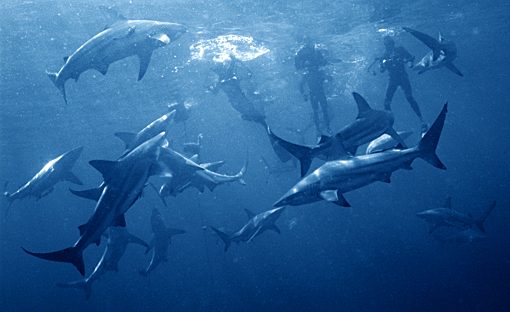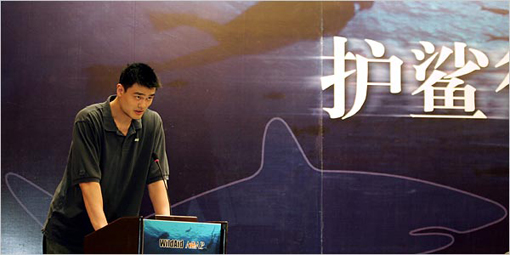You are hereBlogs / WcP.Observer's blog / Hawaii first to ban shark fin soup. Yao Ming: "Endangered species are our friends", stop shark fin soup, stop shark killing
Hawaii first to ban shark fin soup. Yao Ming: "Endangered species are our friends", stop shark fin soup, stop shark killing


(quote)
World's First Ban on Shark Fin Makes Hawaii Global Leader in Shark Conservation
HONOLULU, June 30 /PRNewswire/ -- On the eve of the State of Hawaii becoming the first jurisdiction to ban sales of shark fin soup, local and international conservation groups praised the ground-breaking move as a first step to halting the decimation of global shark stocks.

Fins from up to 70 million sharks a year are used for shark fin soup often with the bodies of the animal dumped overboard dead or alive. In a recent study the world's top shark scientists (IUCN Shark Specialist Group) reported that of 64 species of open ocean sharks and rays 32% are "threatened with extinction," primarily due to overfishing. In addition, 24% were "near threatened," while another 25% could not be assessed due to lack of data. Yet only 3 species have any kind of international protection and the UN CITES convention recently declined to take any action due to opposition led by Japan.
Champion of the Bill Senator Clayton Hee stated, "Hawaii is proud to be at the forefront of the movement to save threatened sharks. For native Hawaiians and other Pacific Islanders sharks are revered, because we recognize their ecological importance, but we have been silent for too long on the decimation of shark stocks globally." Stefanie Brendl of Shark Allies said, "Globally shark catches are unregulated and unsustainable. The shark fin trade is completely unregulated worldwide. This is a first step in giving sharks a future."

"Sharks have been around for nearly 400 million years playing vital roles in marine ecosystems, but at the current rate of overfishing driven by the demand for shark fin soup they could be wiped out in a single human generation," said WildAid director Peter Knights.
International conservation group WildAid released dramatic new evidence that proves that sharks are being finned alive for soup sold in the United States. Footage shot by WildAid shows a live tawny nurse shark dumped on an Indonesian reef with its fins removed. The film is being used in a new public service announcement for global broadcast from NBA player Yao Ming, China's most popular star. Most Americans are unaware of the damage caused by the shark fin industry and that shark fin soup is widely available from Chinese restaurants in the U.S. WildAid's recent survey found one third of Chinese restaurants in San Francisco serving the dish priced from $6.95 to $85 a bowl.

This unprecedented law makes it illegal to sell, possess or distribute shark fins without a permit issued by the Hawaii Department of Land and Natural Resources for shark research or educational purposes or the Hawaii Department of Health, for restaurants possessing fins prepared for consumption by July 1, 2010. Effective July 1, 2011, it will be illegal for these restaurants or retailers to sell or possess fins for shark-fin soup or other shark fin products.
The US Congress is considering the Shark Conservation Act of 2009 that would close a major enforcement loophole by requiring that the fins of sharks caught in federal waters remain naturally attached to the shark. Passage of the federal law would further strengthen and complement Hawaii's new shark protection law.
In China, the largest market for shark fin soup there is a growing groundswell of opposition to shark fin. NBA star and China's most popular figure, Yao Ming and other Chinese sporting and movie icons, as well as leading businessmen, are taking a stand by refusing to eat shark fin soup. Li Ning, who lit the Olympic torch and Liu Huan, who sang in the Beijing Opening ceremony, and a number of gold medal Olympians, including Americans Tara Kirk and Amanda Beard, have pledged not to eat shark fin soup and have recorded public service announcements, which have reached hundreds of millions of Chinese. The campaign has been featured on China's CCTV networks featuring 20 Olympic gold medalists. Last month, 100 Chinese business leaders joined the pledge and Chinese eBay equivalent Alibaba stopped allowing sales of shark fin through their site.

Yao Ming aims to quell China's appetite for shark fin
NBA star and Shanghai Sharks owner Yao Ming urged China to say no to shark fin soup to stop the over-fishing of some species amid growing demand for the delicacy. The Houston Rockets center who bought his hometown's professional team unveiled a television commercial aimed at wealthy Chinese which urges them to stop ordering shark fin soup.
"We have species that need our attention and protection," Yao told reporters at a press conference launching the campaign. "They are endangered by excessive hunting by humans and deprived of habitats due to human greed." The television advertisement produced for the San Francisco-based conservation group WildAid shows Yao pushing away a bowl of shark fin soup that is served to him in an upmarket restaurant.
"If you could see how shark fin is made, could you still eat it?" a voice asks as Yao looks at an aquarium in the dining room where a bleeding shark flails after its fin has been cut off. One by one, sharply dressed diners push their bowls away as Yao says: "When the buying stops, the killing can too."
WildAid President Steve Trent told reporters a survey in China found that two thirds of respondents did not know shark fin came from sharks. Shark fin soup, which can cost more than 100 dollars a bowl, is served at weddings and on important occasions to display wealth, but also because it is believed to improve one's health. However, Trent said a 2007-2008 WildAid study indicated that a quarter of shark fin samples sold at Hong Kong markets were unfit for human consumption. He added that high mercury levels commonly found in shark fin increased the risk of infertility and brain damage.

Growing demand for shark fin -- driven mainly by Chinese consumers -- had caused populations of some shark species to collapse by as much as 99 percent, WildAid said.
The shellfish industry also is threatened by the dwindling shark numbers, Trent said. Sharks help control populations of certain shellfish predators, which have multipied wildly. "With China's leadership, we can save the world's sharks," Trent said. "With Yao's help, this will happen a lot quicker."
Yao, who has been ranked as China's most successful celebrity six years running by Forbes magazine, has been a spokesman for shark preservation since 2006 and bought the Sharks basketball team in July. "Hopefully in future our kids will learn about sharks not only from our team, but they can still see live sharks in the ocean -- not too close," he told reporters after the news conference.
Yao Ming, the 7-foot-6 Shanghai-born N.B.A. star, declared at a Beijing press conference held by WildAid, the conservation group, that he had had it with shark fin soup, pledging never to eat it again. He stated that “endangered species are our friends.”
Swearing off shark fin may not sound like much to Westerners, but here in China, this most expensive delicacy has a long and honorable history. Emperors loved shark fin soup because it was rare, tasty and difficult to prepare. The soup is served at wedding banquets by families eager to show appreciation to their guests. And Hong Kong and Beijing government officials - not to mention thousands of businessmen hoping to close the next big deal - swear they absolutely have to treat their guests to shark fin soup as a show of respect and honor. “This is the very basic dish for business dinners in Hong Kong,” said Tan Rongde, 56, a banker. “If you don’t order that, you will lose face.”
How can Yao Ming - an adored star who once played for the Shanghai Sharks, of all teams (his girlfriend, the 6-foot-2 basketball star Ye Li, is a member of the Shanghai Octopuses) - campaign against a national treasure? “Putting our ecosystem in great peril is certainly not a part of Chinese culture that I know,” Mr. Yao said in an e-mail message, from Guangzhou, where he was preparing for a game. “How do you maintain this so-called tradition when one day there is no shark to be finned?”
Mr. Yao and two other celebrities - the Olympian Li Ning and the pop star Liu Huan -have joined WildAid, which insists that sharks are endangered because of China’s ravenous appetite for skinning off the fins and boiling them for days in a special broth (critics say they’re sometimes finned alive and then thrown back in the sea).
Mr. Yao managed to ruffle a few fins. The Shark’s Fin Association - a group based in Hong Kong intent on blending flavorless shark fin with meat, greens and even herbal medicine - said in effect that Mr. Yao should stick to basketball. Chiu Ching-Cheung, the association chairman, said he and others would team up against the 310-pound center. “We will unite with other shark’s fin associations to communicate and deprecate it,” he said of Mr. Yao’s position.
Yao Ming does have an unlikely ally: a group of shark fin soup chefs. In telephone interviews last week, several chefs hinted that they secretly backed Yao Ming’s stand. “I support Yao,” said Liu Wei Liang, a chef at Lei Garden in Hong Kong, where he has been cooking shark fin for 20 years. “Killing sharks is not a good thing. But if the restaurant did not provide this type of food, the customers feel they will lose face in treating their guests.” He went on to pledge, “If the hotel agrees, I will stop.”
Yao Ming isn’t quite the first celebrity to join the cause. Donald Duck, Mickey Mouse and Goofy also went shark-fin-soup free. The new Hong Kong Disneyland dropped the soup from its wedding banquet menu last year after protests from environmental activists.
Every year, millions of shark fins are sold at Chinese markets to satisfy the demand for shark fin soup, a dish considered a delicacy, but it has been impossible to pinpoint which sharks from which regions are most threatened by this trade. Now DNA research has traced shark fins from the burgeoning Hong Kong market all the way back to the sharks' geographic origin. The scientists found that in some cases fins from scalloped hammerhead sharks came from endangered populations thousands of miles away.
The findings highlight the need to better protect these sharks from international trade, the researchers say. About 73 million sharks are killed for this trade each year, of which 1-3 million are hammerheads, according to Ellen Pikitch a professor of marine science at Stony Brook University in New York. These sharks are particularly prized for their large fin size, and just 1 kg (2.2 lbs) can sell for about $120.
"This trade has operated for years and years under the cover of darkness," Demian Chapman, a researcher at the Institute for Ocean Conservation Science at Stony Brook University, said in a statement. "Our work shows that the scalloped hammerhead fin trade is sourced from all over the globe and so must be globally tracked and managed."
Chapman and his colleagues used a technique called "genetic stock identification" or GSI, to analyze DNA samples from 62 scalloped hammerhead shark fins that had been obtained in the Hong Kong fin market. By examining each fin's mitochondrial DNA sequence — a section of the genetic code passed down by the mother and traceable to a sharks' regional birthplace — the researchers were able to exactly match 57 of the 62 fins to an Atlantic or Indo-Pacific ocean origin.
The team also analyzed mitochondrial sequences taken from 177 live scalloped hammerheads in the Western Atlantic and determined that the species is further divided into three distinct stocks in this region: northern (U.S. Atlantic and Gulf of Mexico), central (Belize and Panama), and southern (Brazil). The scientists traced 21 percent of the Hong Kong fins back to these Western Atlantic stocks. Scalloped hammerheads in the region have been categorized as endangered by the International Union for the Conservation of Nature (IUCN) since 2006. This coastal species appears to have collapsed in the western North Atlantic and Gulf of Mexico.
*Updated on Jan 6, 2012*
May 17, 2011 - Brantford first city in Canada to ban shark fin Brantford, Ont., population of roughly 90,000, is putting itself on the map as the first Canadian jurisdiction to ban shark fin. In a city council meeting Monday night, Brantford councillors voted unanimously in favour of prohibiting the possession, sale and consumption of the Chinese delicacy, aiming to set an example for the rest of the country.
Oct. 7, 2011, Friday - Shark Fin Trade Banned In California: Jerry Brown Signs Bill California's governor announced Friday that he signed a bill banning the sale, trade and possession of shark fins to protect the world's dwindling shark population. Gov. Jerry Brown signed AB376 over objections that the fins are used in a soup considered a delicacy in some Asian cultures.
"The practice of cutting the fins off of living sharks and dumping them back in the ocean is not only cruel, but it harms the health of our oceans," Brown wrote in a statement.
California joined Hawaii, Washington, Oregon and Guam in the ban that environmental and animal rights activists hailed for closing off Pacific ports in the U.S. to the shark fin trade.
October 27, 2011 - Toronto Bans Shark Fin Sales The Toronto City Council voted this week to ban the consumption, possession and sale of shark fins. The move was opposed by the city’s mayor, Rob Ford, and questions were raised about the bylaw’s legal validity, but the motion was approved by a 38-to-4 vote.
Countering supporters of the ban, many of whom wore shark costumes for their appearance at city hall, were several Asian restaurant and grocery store owners who said that the ban would significantly affect their business.
The ban does not go into effect until next September. Violators will face fines ranging from $5,000, for a first offense, to around $100,000. California recently approved a similar ban, as have three other Canadian cities. A campaign is now under way for a national ban in Canada.
06 January 2012 SINGAPORE News: Shark's fin products will no longer be sold at over 100 FairPrice outlets by the end of March this year. The retailer will cease selling shark's fin products at all its retail outlets, which include FairPrice supermarkets, FairPrice Finest, FairPrice Xtra hypermarkets, Cheers and FairPrice Xpress petrol stations, and FairPrice Online. NTUC FairPrice CEO Seah Kian Peng told TODAY that it has been looking into the area of shark's fin products for the last few months, "in our commitment to be a socially responsible retailer."
06 January 2012, NTUC FairPrice -- a cooperative run by the city-state's national trades union -- made the announcement on Thursday after receiving hundreds of complaints.
The uproar was sparked by one of the chain's shark fin suppliers which made the comment "Screw the divers!" in an online promotional message for a new product to be launched at FairPrice outlets during the upcoming Lunar New Year.
The comment, apparently directed at divers campaigning against the shark fin trade, went viral on Facebook and Twitter.
Many of the reactions advocated a boycott of the supplier and FairPrice.
In a statement, FairPrice chief executive Seah Kian Peng said the chain was ceasing sales of shark fin products by the end of March.
Online commentators were also quick to praise the decision: "Thank you for putting sharks and the health of your customers before profit!"
Leonardo DiCaprio joins effort to ban shark fin sales in New York
If Leonardo DiCaprio has his way, an expensive and controversial soup may soon be taken off the menu in restaurants throughout New York. Legislation is currently pending in the state to ban the sale of shark fins, the key ingredient in shark fin soup. On Friday, the celebrity tweeted, “We did it in Cali. C'mon #NewYork! RT @Oceana. Time is running out for bill banning trade of #shark fins. Act now: http://ow.ly/biCvC “
A bowl of shark fin soup will cost you $16.50 at the Chin Chin Restaurant in New York City. Along with the sinewy and stringy fin, that bowl comes with some additional sides that would make anyone with a conscience opt for a spring roll instead. For starters, a shark, one of the top predators in the ocean, gave its life for that small bowl of soup. The animal’s fin was cut-off and it was thrown back into the ocean to die. Rob Stewart, star of the documentary Sharkwater, estimates that 100 million sharks are killed annually for their fins.
If Leonardo DiCaprio has his way, an expensive and controversial soup may soon be taken off the menu in restaurants throughout New York. Legislation is currently pending in the state to ban the sale of shark fins, the key ingredient in shark fin soup. On Friday, the celebrity tweeted, “We did it in Cali. C'mon #NewYork! RT @Oceana. Time is running out for bill banning trade of #shark fins. Act now: http://ow.ly/biCvC “
A bowl of shark fin soup will cost you $16.50 at the Chin Chin Restaurant in New York City. Along with the sinewy and stringy fin, that bowl comes with some additional sides that would make anyone with a conscience opt for a spring roll instead. For starters, a shark, one of the top predators in the ocean, gave its life for that small bowl of soup. The animal’s fin was cut-off and it was thrown back into the ocean to die. Rob Stewart, star of the documentary Sharkwater, estimates that 100 million sharks are killed annually for their fins.
Experts say that the loss of 100 million sharks annually is more than our oceans can bear. Sharks are considered to be “apex” or top predators. When an apex predator is removed from the ocean, a cataclysmic domino effect takes place and the eco-system begins to slowly unravel. In 2005, researchers from the Scripps Institution of Oceanography published results from their study of the relationship between sharks and the health of coral reefs. Per findings of Jordi Bascompte and Carlos Melián:
When sharks are overfished, a cascade of effects can lead to a depletion of important grazers of plant life. This is because there are fewer sharks to feed on carnivorous fish such as grouper-causing an increase in their numbers and their ability to prey on parrotfishes. The removal of plant-eating animals such as parrotfishes has been partly responsible for the shift of Caribbean reefs from coral to algae dominated, the authors note. Thus overfishing of sharks may contribute further to the loss of resistance of coral reefs to multiple human disturbances.
In addition to the destruction of the eco-system, that bowl of soup also packs some pretty noxious neurotoxins. Earlier in 2012, researchers from the University of Miami reported findings from a study of shark fin samples from Florida waters. Dangerously high concentrations of BMAA, a neurotoxin linked to Alzheimer’s and Lou Gehrig’s disease, were present in the samples. “The concentrations of BMAA in the samples are a cause for concern not only in shark fin soup but also in dietary supplements and other forms ingested by humans,” said study co-author Deborah Mash.
Thanks to a nasty encounter with shark fin poachers, Paul Watson, the Founder of Sea Shepherd Conservation Society, is now being held in Germany for extradition to Costa Rica. Watson was arrested on May 13 at Frankfurt airport for a 2002 incident involving Costa Rican shark fin poachers in Guatemalan waters. Sea Shepherd maintains that the charges are baseless. Said Watson, “We were given permission to intervene to stop the killing of the sharks by the Guatemalan government. No one was injured and there was no property damage but the Costa Rican poachers accused us of endangering their lives.” Should he be extradited to Costa Rica, Sea Shepherd has expressed strong concerns about Watson’s safety due to the strong presence of a shark fin mafia, which operates illegally in that country.
Much of the international shark fin trade passes through Hong Kong. In March, Sea Shepherd’s Gary Stokes captured footage of thousands of shark fins drying on the sidewalks of Sheung Wan. Said Stokes, “Pectoral fins lined the streets as far as I could see.” He calculated more than 20,000 dead sharks in one city block. Following this discovery, Stokes went on to uncover corruption within the Convention on International Trade in Endangered Species or CITES. This organization was created by the United Nations to control the trade in endangered species. According to Stokes, Dr. Giam Choo Hoo is the alternative representative for Asia within CITES. He advises the committee as to what does and what does not get protection. “He has been discovered to be working with the Shark Fin Industry and uses his position to lobby within CITES against any protection for sharks,” Stokes said. He has created a petition to remove Dr. Choo Hoo from CITES. Nearly 10,000 have signed since March.
In 2010, Hawaii became the first state in the U.S. to ban the possession, sale and distribution of shark fins. Similar laws have since been passed in Washington and Oregon. Bans are now being sought by lawmakers in Maryland, Illinois and New York.
Venezuela Bans Shark Finning, Establishes Shark Sanctuary
Some much-needed good news for sharks has come from Venezuela this week: The South American country announced it is banning shark finning in its waters and has established a new shark sanctuary.
The country became the last in the Americas to outlaw the practice of cutting off the fins of live sharks and tossing the animals back into the ocean to slowly die.
The country also has created a sanctuary where several important shark species breed, outlawing commercial shark fishing there. The sanctuary consists of 1,440 square miles (3,730 square kilometers) of the Caribbean Sea surrounding the Los Roques Archipelago, a popular tourist destination with pristine beaches and coral reefs, according to a statement from the Pew Environment group.
The new set of measures was decreed this week by Venezuela's minister of land and agriculture, according to Pew's senior adviser on global shark conservation, Max Bello.
Scientists have identified Los Roques, located about 80 miles (128 km) off the Venezuelan coast, as an important breeding ground and nursery for several species, including the lemon shark and the Caribbean reef shark, according to Bello. These young sharks grow up to populate the Caribbean and Atlantic Ocean, he said, so measures enacted there can have wide-ranging effects.
Sharks are highly susceptible to overfishing because they are long-lived, reproduce infrequently and have few offspring. Scientists estimate that up to 73 million are killed annually for their fins, primarily due to increased demand for shark fin soup, particularly in China and Southeast Asia.
"Scientists and fisheries managers universally agree that shark finning is incredibly wasteful and unsustainable," Shiffman told OurAmazingPlanet. "It also makes the job of fisheries managers harder because they don't know what shark the fins come from."
Various studies have shown that shark fins are unsafe to eat, containing high levels of mercury and a neurotoxin implicated in neurodegenerative conditions called BMAA, or Beta-methylamino-L-alanine.
(unquote)
Photos courtesy of Sports Amnesia, Easy Ways to Go Green, Sharksavers.en-html.org, Ethan Daniels / www.deepseaimages.com, The Dorsal Fin, Oceanic Dreams, Claro Cortes IV / Reuters, Dear Kitty. Some blog, AP, and TreeHugger



















The new set of measures was decreed this week by Venezuela's minister of land and agriculture, according to Pew's senior adviser on global shark conservation, Max Bello.